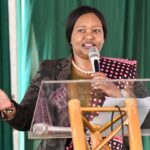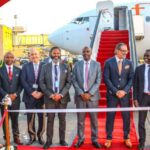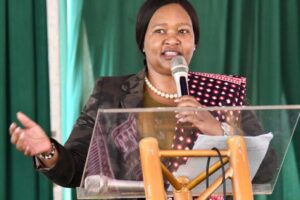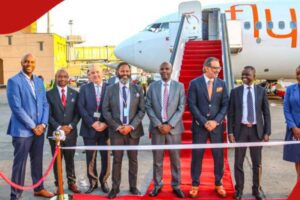[ad_1]
Doctors attached to the Africa Union Mission to Somalia (AMISOM) have given hope to an ailing boy who was referred to the AMISOM Sector 6 hospital in Kismayo, which also extends medical services to the local community, as part of its civil-military initiatives.
12-year-old Ahmed Sahal Osman’s relatives took him to the AMISOM hospital, in critical condition in April 2020.
Doctors at the facility diagnosed the mysterious sickness, afflicting Sahal as Buruli ulcers, a rare skin disease.
“Buruli ulcers, is a chronic disease of the skin, soft tissues and sometimes bones and can lead to permanent disfigurement and long-term disability. The disease is caused by bacteria and results in multiple wounds, which require comprehensive wound care in order to be treated,” stated AMISOM.
According to the World Health Organization (WHO), the disease is endemic in 33 countries in Africa, Latin America and Western Pacific. In 2017, more than 95 percent of new reported cases occurred in 10 countries: Bangladesh, Brazil, China, Ethiopia, India, Kenya, Nepal, Somalia, South Sudan, and Sudan.
Doctors serving under the AMISOM in the coastal city of Kismayo came to rescue, and for the past one year, have been treating and nursing Sahal back to health, to help him regain the full use of his limbs.
How it started
It all started as a pimple, then festering wounds that spread rapidly, to his limbs and other parts of the body, rendering him immobile.
This is a condition that, who hails from Afmadow town in Lower Jubba region of Somalia, about 120 kilometres west of Kismayo has been battling with for almost two years.
Mohamed Nur Mohamed recalls that day in September 2018 when he first spotted what appeared to be a pimple on his nephew’s skin.
“His illness started with repetitive infection which would burst after days. It was very painful. He could neither sleep nor eat,” Mohamed, Sahal’s uncle says.
Faced with the debilitating condition, Sahal, accompanied by his uncle, trekked from the family home in Afmadow, to Kismayo General Hospital in search of treatment.
However, none of the family members at the time anticipated that the journey to recovery would be long and agonizing.
At Kismayo General Hospital, Sahal was not responding to the treatment and his condition kept deteriorating.
Desperation then kicked in as accumulating bills strained the family’s meagre resources.
For months, Sahal was in and out of hospital, with no marked improvement.
Mohamed, Sahal’s uncle is pleased with the progress his nephew is making and quality of medical service at the AMISOM facility, which he considers a blessing.
“A lot has changed since then. He sleeps better now and even plays with the other kids. It’s a great blessing for us, remembering that he couldn’t turn himself in bed, leave alone playing,” Mohamed says.

Capt. Dr Paul Ouma Oluoch, the regimental medical officer at the AMISOM hospital said that Sahal’s condition when they first came in contact was severe.
“He had dirty wounds, he was in pain and was malnourished. His condition required specialized care beyond the ability of the local hospitals in Kismayo,” he said.
Apart from medical care, Oluoch emphasized the critical role of good nutrition in expediting the healing process and is pleased with the progress.
“We also give him food items to make sure that his nutrition is good because as you know with poor nutrition, healing is reduced. He has shown marked improvement and is on the path to recovery,” Oluoch says.
Sahal continues to receive specialized care under the supervision of a dedicated team of AMISOM medical personnel as an outpatient.
Brig. Gen. Abebaw Seid Yimer, the AMISOM Sector Six Commander, stated that Quick Impact Projects, which include providing medical services, foster cordial relations between AMISOM and local communities living within AMISOM’s areas of responsibility, positively impacting on local security.
“AMISOM has a key role in helping the local people, especially those in need, who the hospital helps with the provision of medical services,” Abebaw explains and reiterates AMISOM’s commitment to continue providing such support.
Additionally, he said that AMISOM medical personnel provide skills training to their Somali medical counterparts at the Kismayo General Hospital to capacitate them in delivering health services.
Lt. Col. Godfree Owuor, the commanding officer of Kenya’s Second Mechanized Infantry Battalion (2MIB) in AMISOM, reiterates the importance of cordial relations with the local community and the important role that the hospital has played in boosting those relations.
“In line with the AMISOM mandate, this facility has been able to extend the services to the local people, in this case the Somali security forces as well as the civilians by provision of free medical services,” Owuor says.
Decades of war have negatively impacted Somalia’s health infrastructure, making access to medical care a challenge.
However, with the country enjoying relative peace, the federal government is making efforts to revitalize the health sector.
[ad_2]
Source link















